Thursday, January 8, 2009
xWinLib and Scrapplet announce enhanced drag and drop for Safari users
RadWebTech today released advanced drag and drop functionality for Safari users on the xWinLib and Scrapplet platforms -- no plug-ins required. Safari users now join IE, Firefox, and Mozilla users with the easiest and most powerful drag and drop capabilties on the web. Drag images, text, widgets, gadgets, music, video, websites, and more.
Tuesday, January 6, 2009
Twitter Hacked, Reactively Eyes Solutions, Tweets on the Edge of Data Portability
The recent meltdown of Twitter security raises important issues related to Data Portability, most notably issues of security, integrity, and responsibility, that are relevant to all users. It also serves to demonstrate the need for prioritization by data stores.
Had Twitter simply said, “we will take your data and do whatever we want with it – including giving your login credentials to whomever we want” then no one would have had a problem. Of course they would probably have a lot less users.
But that is not what they said – and that is not the expectation that users had. In fact, in addition to the specific “terms of service” agreement that everyone accepts when they become Twitter users, there is an implied relationship that is created that defines the expectations of both sides. One of those is the reasonable expectation that your login information (including password) would be private and protected.
Now, obviously this is a dynamic world and there are lots of bad guys out there. And it will never be perfect. But there are straight forward solutions to many of these issues – especially in this day and age -- provided their implementations rate the necessary priority in the eyes of the Twitters (and other data stores) of the world.
To Twitters credit, their response has been quick -- and still in process. But more folks need to be proactive, not simply reactive.
Elias Bizannes, a fellow DataPortability board member, talked about this at length over at the official Data Portability blog, as did DP board member Christian Scholz here.
OAuth by itself is not the answer – but it is an important part of the solution. Ultimately the solution involves technologies such as OAuth and OpenID, but it also requires a mindset, commitment, and acceptance of responsibility in proactively keeping the rights of users always in the forefront. This is a main tenant of Data Portability and is an issue likely to dominate the headlines for some time to come – one way or the other. Companies will increasing be called out – or praised --- on this issue depending on their policies and priorities.
Had Twitter simply said, “we will take your data and do whatever we want with it – including giving your login credentials to whomever we want” then no one would have had a problem. Of course they would probably have a lot less users.
But that is not what they said – and that is not the expectation that users had. In fact, in addition to the specific “terms of service” agreement that everyone accepts when they become Twitter users, there is an implied relationship that is created that defines the expectations of both sides. One of those is the reasonable expectation that your login information (including password) would be private and protected.
Now, obviously this is a dynamic world and there are lots of bad guys out there. And it will never be perfect. But there are straight forward solutions to many of these issues – especially in this day and age -- provided their implementations rate the necessary priority in the eyes of the Twitters (and other data stores) of the world.
To Twitters credit, their response has been quick -- and still in process. But more folks need to be proactive, not simply reactive.
Elias Bizannes, a fellow DataPortability board member, talked about this at length over at the official Data Portability blog, as did DP board member Christian Scholz here.
OAuth by itself is not the answer – but it is an important part of the solution. Ultimately the solution involves technologies such as OAuth and OpenID, but it also requires a mindset, commitment, and acceptance of responsibility in proactively keeping the rights of users always in the forefront. This is a main tenant of Data Portability and is an issue likely to dominate the headlines for some time to come – one way or the other. Companies will increasing be called out – or praised --- on this issue depending on their policies and priorities.
Labels:
Data Portability,
DataPortability,
meltdown,
OAuth,
OpenID,
Security,
Twitter
Saturday, December 6, 2008
Most likely to change the world: DataPortability!
It's in the news everywhere: Facebook Connect-this and Google Friends-that...and all the implications for users and their data that it means. Data Portability IS changing the world. So, please take a second and register your vote for Data Portability at the Crunchies:


Sunday, November 30, 2008
Biggest Battle Yet For Social Networks...Data...
I recently responded to a great article by Mike Arrington over at TechCrunch: Biggest Battle Yet For Social Networks: You, Your Identity And Your Data On The Open Web (the full article is here).
My response:
This continues a trend of distributed consolidation. After all, just how many different networks can one possibly join that actually have meaning and engagement? And of them, how many times must one reenter their social graph?
This distributed world is changing in a big way and the standard bearer is data portability. Many of the big guys would rather not have it, but the momentum is forcing them to play. If they can’t beat them – then at least they’d like to be in the center of it all. A serious lands-grab is going on right now and the players include all the big guys and more than a few up-and-comers. Time will tell how it all shakes out, but it all potentially spells good news for users.
In any case, now is not the time to sit on the sidelines. Register your opinion. Be an activist. Let your service providers know what is ok and what is not. Infuence your world!
[Mr. Repetti is the CEO/CTO of RadWebTech.com and a member of the board of the International DataPortability organization (www.dataportability.org). Expressions made herein are made individually]
My response:
This continues a trend of distributed consolidation. After all, just how many different networks can one possibly join that actually have meaning and engagement? And of them, how many times must one reenter their social graph?
This distributed world is changing in a big way and the standard bearer is data portability. Many of the big guys would rather not have it, but the momentum is forcing them to play. If they can’t beat them – then at least they’d like to be in the center of it all. A serious lands-grab is going on right now and the players include all the big guys and more than a few up-and-comers. Time will tell how it all shakes out, but it all potentially spells good news for users.
In any case, now is not the time to sit on the sidelines. Register your opinion. Be an activist. Let your service providers know what is ok and what is not. Infuence your world!
[Mr. Repetti is the CEO/CTO of RadWebTech.com and a member of the board of the International DataPortability organization (www.dataportability.org). Expressions made herein are made individually]
Sunday, November 23, 2008
New Drag and Drop Plug-in Released for Firefox
Today, RadWebTech released the xWinLib_dnd browser plug-in for Windows and Mac-based Firefox (and Mozilla-compatible) browsers. It works in conjunction with the company’s xWinLib JavaScript library.
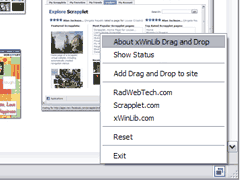 Once installed, the plug-in provides advanced drag and drop functionality for supporting web pages, including cross-domain drag and drop. Additionally, it adds a small icon to the bottom status bar of the browser with single-click access to a popup menu with a number of features.
Once installed, the plug-in provides advanced drag and drop functionality for supporting web pages, including cross-domain drag and drop. Additionally, it adds a small icon to the bottom status bar of the browser with single-click access to a popup menu with a number of features.
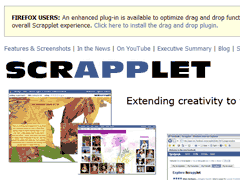 The first site to fully support the enhanced functionality is Scrapplet (www.scrapplet.com). The enhanced functionality makes it easy to mashup pages and web content with drag and drop ease.
The first site to fully support the enhanced functionality is Scrapplet (www.scrapplet.com). The enhanced functionality makes it easy to mashup pages and web content with drag and drop ease.
The plug-in also includes a feature where users can recommend advanced drag and drop adoption by sites that have not currently implemented the ease of use provided by the enhancement.
Webmasters may contact the company directly (bizdev@scrapplet.com) for information about adding the RadWebTech drag and drop functionality to their own sites.
To get the plug-in, goto http://www.scrapplet.com using Firefox. The site’s home page will detect if the plug-in has not been installed and provide an installation link to install it.
 Once installed, the plug-in provides advanced drag and drop functionality for supporting web pages, including cross-domain drag and drop. Additionally, it adds a small icon to the bottom status bar of the browser with single-click access to a popup menu with a number of features.
Once installed, the plug-in provides advanced drag and drop functionality for supporting web pages, including cross-domain drag and drop. Additionally, it adds a small icon to the bottom status bar of the browser with single-click access to a popup menu with a number of features. The first site to fully support the enhanced functionality is Scrapplet (www.scrapplet.com). The enhanced functionality makes it easy to mashup pages and web content with drag and drop ease.
The first site to fully support the enhanced functionality is Scrapplet (www.scrapplet.com). The enhanced functionality makes it easy to mashup pages and web content with drag and drop ease.The plug-in also includes a feature where users can recommend advanced drag and drop adoption by sites that have not currently implemented the ease of use provided by the enhancement.
Webmasters may contact the company directly (bizdev@scrapplet.com) for information about adding the RadWebTech drag and drop functionality to their own sites.
To get the plug-in, goto http://www.scrapplet.com using Firefox. The site’s home page will detect if the plug-in has not been installed and provide an installation link to install it.
Saturday, November 22, 2008
MashupCamp: DAY THREE
The final day of MashupCamp started as before with introductory remarks by Dave Berlind. This morphed into the second discussion panel of the conference: “Making Money with Mashups.”
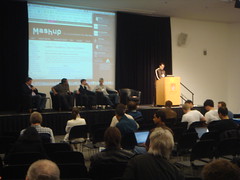 The panelists included mashup entrepreneurs Yobie Benjamin, Andres Ferrate, and Taylor McKnight combined with local valley VC, Jeff Clavier. Insightful and timely, the conversation confirmed the value of the new camp format which now includes this type of panel discussion.
The panelists included mashup entrepreneurs Yobie Benjamin, Andres Ferrate, and Taylor McKnight combined with local valley VC, Jeff Clavier. Insightful and timely, the conversation confirmed the value of the new camp format which now includes this type of panel discussion.
The rest of the day was dominated by the “Best Mashup” competitions. Many of the sponsors, including my company, RadWebTech, offered prizes for the best mashup showing off the sponsors products or technology. And, the conference itself offered a Mac Book Pro for the best overall Mashup.
One sponsor, the Elfenworks Foundation, wasn’t a solutions provider at all, rather they sought to encourage their cause through the sponsoring of a mashup contest. It was an inspired and compelling way to increase the visibility of an important issue: social justice and domestic poverty.
Contestants were split into two groups to present their works in one of two reverse speed-geeking sessions. In this format, the entrants displayed the fruit of their labors on high-top tables while the other 300+ participants went from table to table in 8-minute spurts with Dave the whistle guy blowing his woo-woo machine in between.
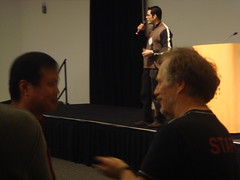 Lunch and the keynote speech from legendary Tim O’Reilly separated the two sessions. Tim fired up the crowd with his data-centric view of the world – a concept well received by the mashup community – and ended on the theme of data portability – a timely topic uniquely tied to my own efforts in the DataPortability organization.
Lunch and the keynote speech from legendary Tim O’Reilly separated the two sessions. Tim fired up the crowd with his data-centric view of the world – a concept well received by the mashup community – and ended on the theme of data portability – a timely topic uniquely tied to my own efforts in the DataPortability organization.
Through the contribution of TechWeb and the sponsors of MashupCamp, my company RadWebTech included, the entire event is provided to all attendees free of charge. Entrance into the mashup contests likewise only requires the desire to participate.
Entries ranged from story-board presentations, to commercial-grade applications, as well as mashup creations birthed from all-night programming sessions. Several were actually (or wannabe) commercial products taking advantage of the free venue to display their wares. Geeks are often socially challenged but they’re not dumb, and needless to say none of these conference trespassers won.
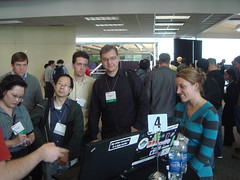 The real stars shined in the bleary eyes of exhausted mashup developers that somehow found the energy to speed-geek their creations with enthusiasm. The top entries that caught my attention included a variant on tag clouds, a compelling way to search and view videos, a plug-in that brought mashup capabilities to any web page, and several mobile-based solutions.
The real stars shined in the bleary eyes of exhausted mashup developers that somehow found the energy to speed-geek their creations with enthusiasm. The top entries that caught my attention included a variant on tag clouds, a compelling way to search and view videos, a plug-in that brought mashup capabilities to any web page, and several mobile-based solutions.
Many of the mashups demonstrated integration with wikis and other social elements, back-end data sources, and even the semantic web – all brought together through the use of tools provided by several of the solutions providers/sponsors, including: Mozenda, WetPaint, and Calais.
My company’s product, DistroMash, was used by contestants as a mashup container that was then rendered on the Scrapplet presentation platform (another of RadWebTech’s products).
After all the presentations were completed, and the final woo-woo from Dave’s horn was heard, conference participants were asked to “vote” for their favorite mashup and best solutions provider. The voting was accomplished by ignoring your mother’s warnings not to take wooden nickels. Each participant was provided an actual wooden nickel for best mashup and another for best solutions provider – and they were a highly sought currency by both contestants and providers.
After tallying the vote (counting of the nickels), the great hall hosted the final get together award ceremony and cocktail party. Dave held the stage as he went through the recognitions. The tables of beer and wine were just out of reach and teased the crowd as they were wholly off limits until the last award was presented.
Best overall mashup went to Dean Mao for his Firefox plug-in that mashed up the world. Each sponsor selected their winner and presented prizes ranging from hard drives and other equipment to cold hard cash.
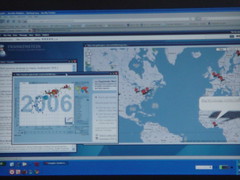 The winner of RadWebTech’s best Mashup using DistroMash was a team of interns from SAP, Martin Czuchra and Jennifer Baldwin:
The winner of RadWebTech’s best Mashup using DistroMash was a team of interns from SAP, Martin Czuchra and Jennifer Baldwin:
“We aimed to create awareness of poverty issues in a user's neighborhood by showing such elements on a map. We aggregated RSS feeds with Yahoo Pipes and also added geotagging with Yahoo Pipes. We then plotted this information on Google Maps. Finally we created the web application with DistroMash adding a feed reader, the map and a visualization from gapminder.”
Before I presented them with their brand new Playstation 3 and deluxe SOCOM (with blue-tooth headset!), I got to thank everyone for their participation and point out that the new generation, represented by these two young interns, wasn’t replacing our generation – they were expanding the world of mashups that included all generations.
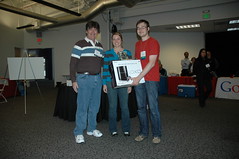 After the obligatory pictures, I asked how they were going to share their award and suggested alternating Tuesdays, Thursdays, and every other weekend joint custody.
After the obligatory pictures, I asked how they were going to share their award and suggested alternating Tuesdays, Thursdays, and every other weekend joint custody.
Finally, the recognitions and congratulations were finished and the drinking began – but not without one last twist to the Mashup theme. The good folks from Calais introduced balsa wood airplane kits to the crowd and challenged them to mash them up for a flying contest (no cash prizes this time).
Beer, geeks, and gliders. ‘nough said.
Congrats to all who attended this spectacular event, thanks to TechWeb, David Berlind, Greg, Angela, and Elizabeth, and to all of the sponsors who contributed. I can’t wait until the next one. I’ve already mashed it up on my calendar.
Click here to see all of my pics from the conference.
[this was the last in a three part series about MashupCamp, fall 2008]
 The panelists included mashup entrepreneurs Yobie Benjamin, Andres Ferrate, and Taylor McKnight combined with local valley VC, Jeff Clavier. Insightful and timely, the conversation confirmed the value of the new camp format which now includes this type of panel discussion.
The panelists included mashup entrepreneurs Yobie Benjamin, Andres Ferrate, and Taylor McKnight combined with local valley VC, Jeff Clavier. Insightful and timely, the conversation confirmed the value of the new camp format which now includes this type of panel discussion.The rest of the day was dominated by the “Best Mashup” competitions. Many of the sponsors, including my company, RadWebTech, offered prizes for the best mashup showing off the sponsors products or technology. And, the conference itself offered a Mac Book Pro for the best overall Mashup.
One sponsor, the Elfenworks Foundation, wasn’t a solutions provider at all, rather they sought to encourage their cause through the sponsoring of a mashup contest. It was an inspired and compelling way to increase the visibility of an important issue: social justice and domestic poverty.
Contestants were split into two groups to present their works in one of two reverse speed-geeking sessions. In this format, the entrants displayed the fruit of their labors on high-top tables while the other 300+ participants went from table to table in 8-minute spurts with Dave the whistle guy blowing his woo-woo machine in between.
 Lunch and the keynote speech from legendary Tim O’Reilly separated the two sessions. Tim fired up the crowd with his data-centric view of the world – a concept well received by the mashup community – and ended on the theme of data portability – a timely topic uniquely tied to my own efforts in the DataPortability organization.
Lunch and the keynote speech from legendary Tim O’Reilly separated the two sessions. Tim fired up the crowd with his data-centric view of the world – a concept well received by the mashup community – and ended on the theme of data portability – a timely topic uniquely tied to my own efforts in the DataPortability organization.Through the contribution of TechWeb and the sponsors of MashupCamp, my company RadWebTech included, the entire event is provided to all attendees free of charge. Entrance into the mashup contests likewise only requires the desire to participate.
Entries ranged from story-board presentations, to commercial-grade applications, as well as mashup creations birthed from all-night programming sessions. Several were actually (or wannabe) commercial products taking advantage of the free venue to display their wares. Geeks are often socially challenged but they’re not dumb, and needless to say none of these conference trespassers won.
 The real stars shined in the bleary eyes of exhausted mashup developers that somehow found the energy to speed-geek their creations with enthusiasm. The top entries that caught my attention included a variant on tag clouds, a compelling way to search and view videos, a plug-in that brought mashup capabilities to any web page, and several mobile-based solutions.
The real stars shined in the bleary eyes of exhausted mashup developers that somehow found the energy to speed-geek their creations with enthusiasm. The top entries that caught my attention included a variant on tag clouds, a compelling way to search and view videos, a plug-in that brought mashup capabilities to any web page, and several mobile-based solutions.Many of the mashups demonstrated integration with wikis and other social elements, back-end data sources, and even the semantic web – all brought together through the use of tools provided by several of the solutions providers/sponsors, including: Mozenda, WetPaint, and Calais.
My company’s product, DistroMash, was used by contestants as a mashup container that was then rendered on the Scrapplet presentation platform (another of RadWebTech’s products).
After all the presentations were completed, and the final woo-woo from Dave’s horn was heard, conference participants were asked to “vote” for their favorite mashup and best solutions provider. The voting was accomplished by ignoring your mother’s warnings not to take wooden nickels. Each participant was provided an actual wooden nickel for best mashup and another for best solutions provider – and they were a highly sought currency by both contestants and providers.
After tallying the vote (counting of the nickels), the great hall hosted the final get together award ceremony and cocktail party. Dave held the stage as he went through the recognitions. The tables of beer and wine were just out of reach and teased the crowd as they were wholly off limits until the last award was presented.
Best overall mashup went to Dean Mao for his Firefox plug-in that mashed up the world. Each sponsor selected their winner and presented prizes ranging from hard drives and other equipment to cold hard cash.
 The winner of RadWebTech’s best Mashup using DistroMash was a team of interns from SAP, Martin Czuchra and Jennifer Baldwin:
The winner of RadWebTech’s best Mashup using DistroMash was a team of interns from SAP, Martin Czuchra and Jennifer Baldwin:“We aimed to create awareness of poverty issues in a user's neighborhood by showing such elements on a map. We aggregated RSS feeds with Yahoo Pipes and also added geotagging with Yahoo Pipes. We then plotted this information on Google Maps. Finally we created the web application with DistroMash adding a feed reader, the map and a visualization from gapminder.”
Before I presented them with their brand new Playstation 3 and deluxe SOCOM (with blue-tooth headset!), I got to thank everyone for their participation and point out that the new generation, represented by these two young interns, wasn’t replacing our generation – they were expanding the world of mashups that included all generations.
 After the obligatory pictures, I asked how they were going to share their award and suggested alternating Tuesdays, Thursdays, and every other weekend joint custody.
After the obligatory pictures, I asked how they were going to share their award and suggested alternating Tuesdays, Thursdays, and every other weekend joint custody.Finally, the recognitions and congratulations were finished and the drinking began – but not without one last twist to the Mashup theme. The good folks from Calais introduced balsa wood airplane kits to the crowd and challenged them to mash them up for a flying contest (no cash prizes this time).
Beer, geeks, and gliders. ‘nough said.
Congrats to all who attended this spectacular event, thanks to TechWeb, David Berlind, Greg, Angela, and Elizabeth, and to all of the sponsors who contributed. I can’t wait until the next one. I’ve already mashed it up on my calendar.
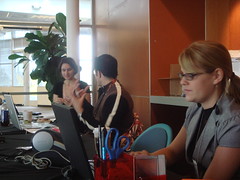 | 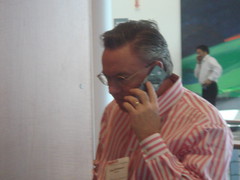 |
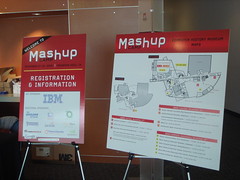 | 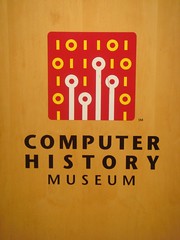 |
Click here to see all of my pics from the conference.
[this was the last in a three part series about MashupCamp, fall 2008]
Labels:
david berlind,
DistroMash,
MashupCamp,
MashupCamp2008,
RadWebTech,
Tim O'Reilly
MashupCamp: DAY TWO
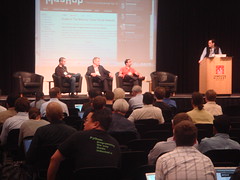 The second day of MashupCamp picked up where the previous day left off. Dave brought everyone up-to-date with the plans for the day and then the general assembly morphed into the first panel discussion: “Making the Case for Mashups in Business.”
The second day of MashupCamp picked up where the previous day left off. Dave brought everyone up-to-date with the plans for the day and then the general assembly morphed into the first panel discussion: “Making the Case for Mashups in Business.”Discussion panels are new to the MashupCamp agenda and are a welcome addition. They balance the “un-conference” nature of the program and provide a good transition between the various parts.
John Musser of Programmable Web, author and technologist Dan Woods, and security guru Hart Rossman brought their considerable experience together for the mashups in business discussion.
 Following the always informative sometimes intense conversation, the conference moved into the un-conference portion of the agenda: scheduling for the unscheduled discussions. A huge grid was placed on the wall of the auditorium with meeting rooms listed across the top and time slots down the side. Anyone that wanted to could suggest a discussion topic, announce it, write it out landscape-style on a piece of paper, and tape it to an available slot.
Following the always informative sometimes intense conversation, the conference moved into the un-conference portion of the agenda: scheduling for the unscheduled discussions. A huge grid was placed on the wall of the auditorium with meeting rooms listed across the top and time slots down the side. Anyone that wanted to could suggest a discussion topic, announce it, write it out landscape-style on a piece of paper, and tape it to an available slot. The un-conference concept is dynamically generated crowd-conferencing where every individual voice has the opportunity to be heard. And if you find yourself sitting in a discussion that fails to hold your interest, you are encouraged to vote with your two feet – right out the door and into another, hopefully more engaging, conversation.
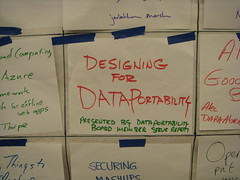 The session I hosted was entitled “Designing for DataPortability.” As you may know, I sit on the board of the International DataPortability organization. I was fortunate that three other members of the twelve person world-wide board also joined me, including the chairwoman of the organization.
The session I hosted was entitled “Designing for DataPortability.” As you may know, I sit on the board of the International DataPortability organization. I was fortunate that three other members of the twelve person world-wide board also joined me, including the chairwoman of the organization.There are lots of great things happening in the world of data portability and in particular with the DataPortability organization. The conversation was brisk, intense, and spanned many aspects of the current and envisioned state of data portability.
Following five hours of un-conference discussions, Dave held a wrap up followed by a mandatory meeting for “Best Mashup” competitors. The latter prepared the contestants for the day to follow where they and their creations would be the stars of the show, and one would be crowned king (or queen).
 The second day of the conference officially ended around 6pm, however many eager (and harried) contest entrants were huddled in corners, strewn around the various tables of the main hall, or hunkered down in the conference-provided “hacker’s den.” This went on for some time into the evening as they all endeavored to create the next great award-winning mashup for fame, glory, bragging rights -- and cool prizes!
The second day of the conference officially ended around 6pm, however many eager (and harried) contest entrants were huddled in corners, strewn around the various tables of the main hall, or hunkered down in the conference-provided “hacker’s den.” This went on for some time into the evening as they all endeavored to create the next great award-winning mashup for fame, glory, bragging rights -- and cool prizes![This is the second party of a three part article]
Subscribe to:
Posts (Atom)
